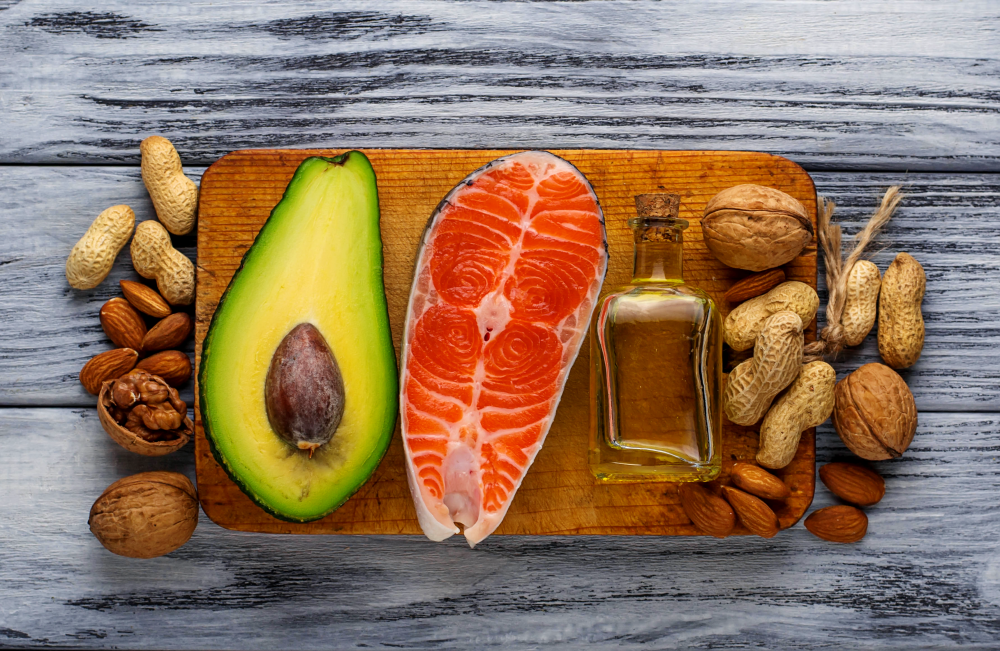Fat is one of three macronutrients found in food that is essential for cell survival in humans. However, it is often demonized as being “unhealthy”. But that couldn’t be further from the truth. Some fats have been linked to improved cognition and decreasing the risk of neurodegenerative disease. With that said, not all fat is created equal. There are two main fat groups.
Saturated fats are found in meat and dairy and unsaturated fats found in vegetable oils, nuts, and fish. Some saturated fats can be harmful if consumed in large amounts. On the other hand, unsaturated fats have significantly greater health benefits.
In this article, you will learn the difference between saturated and unsaturated fats, and how to select the best foods to get the maximum health benefits.
Health Benefits of Dietary Fats
Fat, also called triglycerides, have a number of health benefits.
- Energy: Fats are used for energy once glucose in the blood is depleted. Excess fat gets stored in the fat cells and in the liver. Fat provides 9 calories/ gram and therefore is a more concentrated source of energy compared to carbohydrates and protein (which provide 4 calories/gram). They are an important source of fuel for the body, especially during prolonged exercise or when carbohydrate stores are low.
- Nutrient absorption: Fats are necessary for the absorption of fat-soluble vitamins (A, D, E, and K) and other important nutrients such as carotenoids.
- Hormone production: Fats are essential for the production of hormones, including sex hormones and adrenal hormones.
- Cell membrane structure: Fats are a major component of cell membranes, helping to maintain their structure and function.
- Brain function: Fats are important for brain function, as the brain is composed of about 60% fat. Adequate intake of omega-3 fatty acids, in particular, has been linked to improved cognitive function and a reduced risk of dementia.
- Skin health: Fats are important for maintaining healthy skin, as they help to keep it moisturized and supple.
But as stated earlier, not all fats are created equal, and some types of fats can have negative health effects.
Harms associated with trans fatty acids (trans fat)
Trans fats, also known as partially hydrogenated vegetable oil is far more harmful than saturated fats. The most common type of trans fat is man-made. It’s created through a manufacturing process called hydrogenation and is used to extend the shelf life of food products.
Trans fats are known to:
- Increase LDL cholesterol (bad cholesterol) and decrease HDL cholesterol (good cholesterol) in the blood
- Impair insulin sensitivity: Trans fats may impair insulin sensitivity, which can increase the risk of type 2 diabetes.
- Harmful effects on the brain: Trans fats have been linked to cognitive decline and an increased risk of Alzheimer’s disease.
- No nutritional value: Trans fats provide no nutritional value and are not essential for health.
- Increase inflammation: Trans fats can increase inflammation in the body, which is linked to a variety of health problems, including heart disease, diabetes, and cancer.
The good news is that these fats are so bad they have been ban in most countries. However, there is a little loop hole in the “rules” and if there is less than 0.5 grams/serving, food manufacturers can put “0 grams” on the label.
That said, it is important to recognize the types of foods that may contain these harmful fats and make the effort to avoid them.
Foods that contain potentially harmful amounts of trans fats
- Fast foods—including tater tots, and French fries
- Most spreads—such as margarine spreads or peanut butter
- Snack foods—such as chips, crackers, and cookies
- Fried foods—including fried chicken, onion rings, and nuggets
- Nondairy creamer
- Pre-prepared cake frostings
- Vegetable shortening
- Commercially pre-prepared products, such as pie crusts, pizza dough, and cookie dough
- Pastries, donuts, and pies
“Healthy Fats”
Healthy fats are types of fats that provide important health benefits.
Here are some examples of healthy fats:
Monounsaturated fats
These fats are found in foods such as olive oil, avocados, nuts (such as almonds, cashews, and peanuts), and seeds (such as pumpkin and sesame seeds). They can help to lower LDL (bad) cholesterol levels and reduce the risk of heart disease.
Polyunsaturated fats
These fats are found in foods such as fatty fish (such as salmon, mackerel, and sardines), flaxseeds, chia seeds, and walnuts. They are important for brain function and can help to reduce inflammation in the body.
Omega-3 fatty acids
These are a type of polyunsaturated fat that are particularly important for heart health and brain function. They are found in fatty fish, flaxseeds, chia seeds, and walnuts.
Saturated fats
While saturated fats have been traditionally considered unhealthy, recent research suggests that some types of saturated fats (such as those found in coconut oil and grass-fed butter) may have health benefits when consumed in moderation.
It’s important to note that all fats are high in calories, so it’s important to consume them in moderation as part of a balanced diet. Aim to replace unhealthy fats (such as trans fats and saturated fats from processed foods) with healthy fats from whole foods.
Other articles you may be interested in:
Benefits of Olive Oil and How To Use It in the Kitchen
Olive oil consumption is steadily increasing, and it’s easy to see why. It’s rich in antioxidants and omega-3s that keep your body in peak health. The oil is particularly beneficial in its least processed form: cold pressed extra virgin olive oil. The widespread...
Drink Your Way To Good Health With BEAM’s Super Greens
Finding it hard to meet your body’s nutritional needs? You’re not alone. According to the Dietary Reference Intakes, a staggering 92% of Americans suffer from at least one vitamin or mineral deficiency. Deficiencies for most nutrition indicators could be as high as...
You might be beyond help…
"If you're not willing to learn, no one can help you. If you're determined to learn, no one can stop you." - Zig Ziglar Spoiler alert, you and I don't have it all figured out. Yup. As much as I hate to admit it, there are things I don't know. And if I am being really...
Einstein was correct…..
“There are only two ways to live your life. One is as though nothing is a miracle. The other is as though everything is a miracle.”― Albert Einstein If you are reading this, congratulations. This means you have eyes that can read, and a brain that has the ability to...
5 Grounding Mats for Health Enthusiasts
A growing body of research is showing that grounding—the act of allowing the feet to come into direct contact with the Earth—offers health benefits. For those of us who are pressed for time, live in concrete jungles, and find it difficult to visit natural...
Grounding Mats: A Groundbreaking Way To Embrace Good Health
If you’ve ever walked barefoot on the earth, you might have felt recharged and reinvigorated. This sensation isn’t a mere coincidence. Instead, the positive effects we feel when we let our feet touch the Earth’s natural surface—an activity called grounding or...
Truth V Useful
"The more in harmony with yourself you are, the more joyful you are and the more faithful you are. Faith is not to disconnect you from reality - it connects you to reality". Paulo Coelho Faith is believing in something you can’t see. Of course, this is true for those...
What Can Blue Zone Residents Teach Us About Life, Health, and Longevity?
Today, we have more scientists, doctors, and nurses. There are also larger investments in healthcare and wellness, more experimental treatments, and more research papers than ever. And yet our world remains riddled with disease and health conditions. Consider that in...
Start Today……
Don't be afraid to give your best to what seemingly are small jobs. Every time you conquer one it makes you that much stronger. If you do the little jobs well, the big ones will tend to take care of themselves. - Dale Carnegie “Thanks, but what else can I do”. Yes,...
The Miracle of Faith: How It Can Help You Live Longer
“Religion” gets criticized and mocked, but nobody (not even science) can deny it can be good for you. For starters, a study of more than 1,500 newspaper obituaries from across the U.S. shows it can help you live 9.45 years longer than non-spiritual folks. But this...











